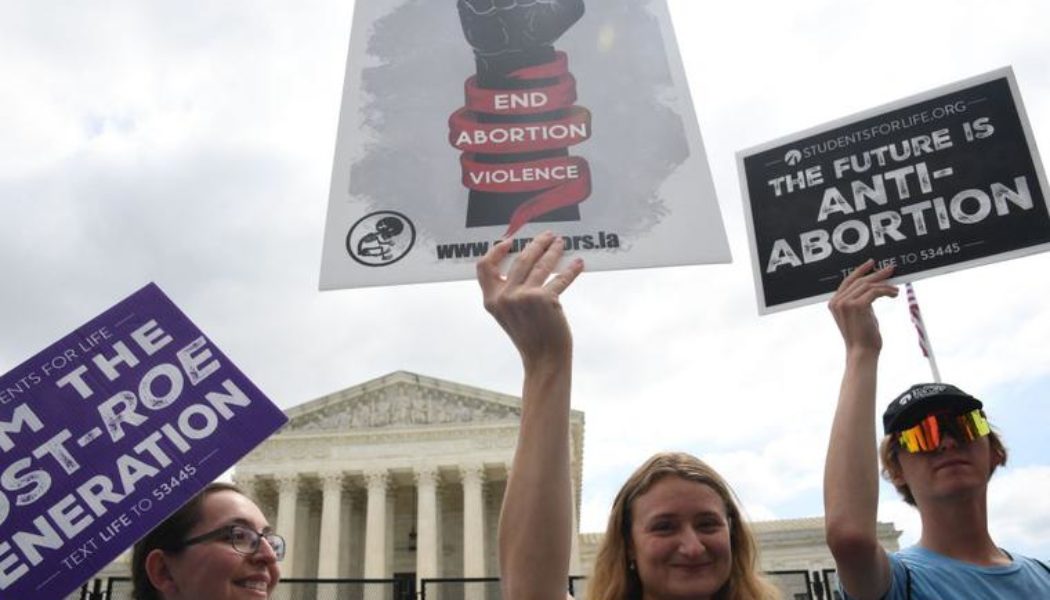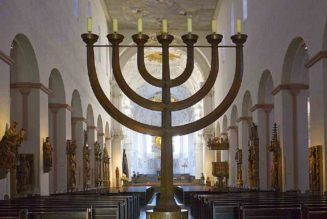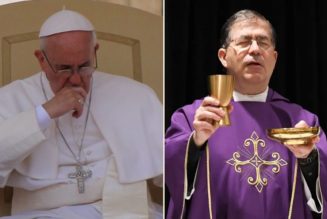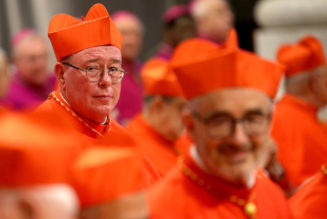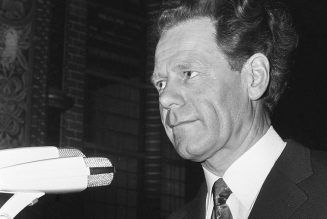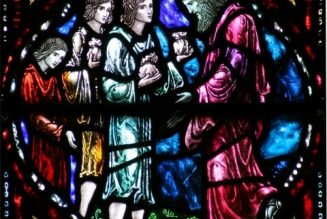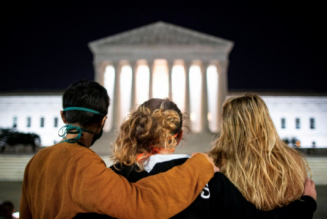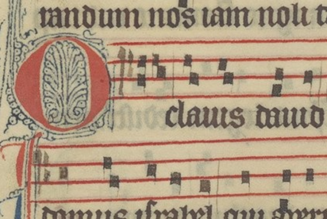
The nightmare is over. In his masterful opinion for the Supreme Court in Dobbs v. Jackson Women’s Health Organization, Justice Samuel Alito consigned the constitutional right of abortion to the ash heap of history. Alito’s criticisms of Justice Harry Blackmun’s opinion in Roe v. Wade are deep and cutting — and entirely justified. Roe was, Alito wrote, “egregiously wrong from the start.” It was “on a collision course with the Constitution from the day it was decided.” Just so.
Dobbs is a monumental accomplishment, but not only by lawyers and judges. Far from it. At any moment since Roe was decided, five able lawyers willing to overturn it could easily have been assembled. The hard part was getting them onto the Supreme Court. Dobbs is the culmination of a half-century of dedicated work by countless Americans committed to doing just that.
The court’s decision is a testament to all those who shaped our culture and thus our politics, to everyone who in season and out of season labored to keep the flame of life burning bright. This day is justly celebrated for the courage and legal acumen of our justices. It is even more a day to be thankful for the millions who made what the court did today possible.
That includes Catholics above all others, for they have always been in the forefront of America’s pro-life movement. If so many Catholics had not put aside their qualms about his character and temperament, and voted for Donald Trump because of who he promised to appoint to the high court, Hillary Clinton would have become president in 2017 and might still be. In that case, Roe v. Wade would be the law of the land tomorrow, next week and next year.
Three-fifths of the Dobbs majority — Justices Amy Coney Barrett, Neil Gorsuch and Brett Kavanaugh — would now instead be serving on lower courts.
Defending unborn lives has long been a specifically Catholic cause in the United States. Catholic opposition before Roe slowed the then-stirring political movement to liberalize state abortion laws. Richard Land was from 1988 until 2013 president of the Southern Baptists’ Ethics & Religious Liberty Commission. His church is now a stalwart of the pro-life movement. It was not always so. Land recently said that “abortion wasn’t much of an issue for Baptists until Roe.” Baptists thought of it as a “Catholic issue.” And that made it harder, Land confessed, for Baptists to get involved.
This prejudice infected the Supreme Court when it decided Roe. University of Virginia Law professor John Jeffries served as a clerk to Justice Lewis Powell starting in 1973. In his authorized biography of Powell, Jeffries wrote that the “idea that a fertilized embryo was a fully recognized human life would always seem to [Powell] unacceptably remote from ordinary experience. That this belief was closely associated with the Catholic Church only made it easier for him to dismiss.” That the court’s only Catholic — William Brennan — was arguing along these lines within the court made it even easier for Powell, and perhaps for other justices, to dismiss the pro-life case.
The New York Times’ front-page report of Roe was flanked by another about “reaction” to it. The title of that story was “Cardinals Shocked.” That story was not a fugitive from the sports pages. The politically savvy opinion in 1973 was that, for a little while after Roe, the Catholic bishops would make a ruckus about it. Good: That would confirm (for Southern Baptists, among others) that opposition to abortion was mostly what the Roe Court said it was: sectarian, theological, Catholic. Few non-Catholics would follow the bishops’ lead. (This was before Catholics stopped following the bishops’ lead.) Then, soon, opposition to Roe and to abortion would wither away, until it resided on the fringes of the religious right.
It did not turn out as the savants predicted. With pro-abortion Catholic politicians grabbing the headlines today, Catholics might forget to take the full measure of satisfaction with Dobbs that they have earned.
Dobbs makes clear that a majority of the justices will uphold any restriction on abortion access. (That calculation will be unaffected by Ketanji Jackson’s elevation to the high court later this summer, for she could not be more pro-choice than the man she succeeds, Stephen Breyer.) Even a state criminal prohibition on abortion, so long as there is an exception to save the mother’s life and, maybe, to prevent serious bodily injury to her, is now constitutionally safe. Estimates vary. A safe guess would be that approximately twenty states will enact such laws.
Dobbs is an essential step towards the pro-life movement’s animating goal: every child welcome in life and protected by law from the moment of fertilization onward. It is however only the penultimate step. Dobbs did not go as far in protecting life as it could have and, in my judgment, should have. This next step would have been to say that unborn babies are “persons” who enjoy a constitutional right to life under the Equal Protection Clause, just the same as you and I enjoy. Then every state would be constitutionally required to enact laws that all but ban abortion. Without this constitutional guarantee of life, the unborn would be safe from destruction in, say, Mississippi, if pro-lifers there follow up on Dobbs by passing a near total ban on abortions. But the unborn remain in mortal peril in, for example, California, because the Dobbs Court signaled that it would uphold permissive laws, just as it would restrictive ones.
A careful look at the entire Dobbs opinion, however, suggests that this signal is misleading. Although Dobbs effectively denies an equal right to life to the unborn through the front door (if you will) of the Equal Protection Clause, it puts the building blocks in place for future litigation which could deliver to unborn human beings through the back door all, or almost all, of the protection that they justly deserve. The Equal Protection route would have delivered all that the Constitution itself could promise to the unborn: equality among all human persons, from the moment of fertilization until natural death. The rest of the work would then be to enforce the Constitution against rogue abortion states such as California, which would exploit any possible way to resist such a clear mandate for life. Instead, the Dobbs Court mapped out a longer, more labor-intensive path to that just equality, much of it to be done in the courts.
Here is that pathway.
The Dobbs Court pledged to apply its “rational basis” test to all regulations of abortion going forward. This familiar standard in constitutional law is usually a modest test, not very stringent or critical. Its aim is to weed out unreasoned line-drawing by public authorities. Laws do not have to be perfect or even very good according to this metric. But they must not be “arbitrary.”
Would a permissive abortion law such as California’s abortion-on-demand regime pass constitutional muster under the “rational basis” test? It surely should not. That is because in truth there is no substantial change in the moral status and worth of the unborn child, between the formation of what biology indisputably establishes is a unique human individual at the moment of fertilization and the birth of that individual months later.
DNA research conducted since Roe shows, moreover, that all of the information needed to direct the tiny person’s growth throughout life is present at fertilization; thus, the existential continuity of everyone from fertilization until natural death. The vivid pictures of our unborn children and grandchildren, nieces and nephews we have all seen from sonograms confirm what these scientific facts indicate: Each one of us began as a person in the morally significant sense when our bodies began at conception. Harry Blackmun came to be as a one-cell embryo, just like you and I did.
Is there any evidence that the Dobbs Court is inclined to accept this form of argument?
Yes, plenty. In fact, the Dobbs Court supplied a roadmap through this argument to the conclusion that permissive abortion laws lack a “rational basis,” in the course of demolishing “viability” as a significant dividing line about the moral worth of the unborn child.
First the court established that the relevant characteristic, feature or capacity of anyone who has a right to life must be intrinsic to the being whose humanity is being investigated. It cannot be anything extrinsic. Nothing circumstantial will do. Much less could this dignity-conferring quality be something about anyone else’s ability or willingness or desire to care for the being whose dignity is being considered. In other words, our value, our moral worth, our dignity arises from who and what we are, not from what anyone else thinks of us or is willing to do for us. It has nothing to do with being wanted, or unwanted.
According to Dobbs, “[t]he most obvious problem with any such argument is that viability is heavily dependent on factors that have nothing to do with the characteristics of a fetus. … One is the state of neonatal care at a particular point in time. … And if viability is meant to mark a line having universal moral significance, can it be that a fetus that is viable in a big city in the United States has a privileged moral status not enjoyed by an identical fetus in a remote area of a poor country?”
The Supreme Court then relied crucially upon the no-substantial-change-from-the-moment-of-fertilization line of reasoning previewed above. “If ‘viability’ means the ability to survive outside the womb, why is this the point at which the State’s interest becomes compelling? If, as Roe held, a State’s interest in protecting prenatal life is compelling ‘after viability,’ why isn’t that interest ‘equally compelling before viability’?”
Dobbs reported that “Roe did not say, and no explanation is apparent.” “Viability” is, the Court concluded, an “arbitrary line.” In constitutional law, “arbitrary” is a synonym for “irrational.”
The court then rightly extended this same argument beyond “arbitrary” prenatal distinctions (such as “viability”) to those assertedly distinguishing between pre- and-post-natal human beings. This “arbitrary line,” the Dobbs Court wrote, “has not found much support among philosophers and ethicists who have attempted to justify a right to abortion. Some have argued that a fetus should not be entitled to legal protection until it acquires the characteristics that they regard as defining what it means to be a ‘person.’ Among the characteristics that have been offered as essential attributes of ‘personhood’ are sentience, self awareness, the ability to reason, or some combination thereof.”
The problem, according to the Court, is that “[b]y this logic, it would be an open question whether even born individuals, including young children or those afflicted with certain developmental or medical conditions, merit protection as “persons.”
In other words: there are only arbitrary distinctions along the long line of anyone’s life, between the unborn child at any stage of his or her development and the newborn, or the toddler, or the teen, or the man or woman in full, or the grandfather presently writing these words.
My point is not that the majority justices in Dobbs already have in mind striking down permissive abortion laws as irrational.
Very likely they do not.
My point is that, nevertheless, Dobbs shows that a majority accepts as sound all the main premises needed in future litigation to protect unborn babies from abortion just as if they are constitutional persons.
Dobbs strikes the necessary first, huge blow on the march to equal justice for every human being. Even if these justices built better than they know, they have built it just the same.
Gerard V. Bradley is a professor of law at the University of Notre Dame and was for many years president of the Fellowship of Catholic Scholars.
Join Our Telegram Group : Salvation & Prosperity
